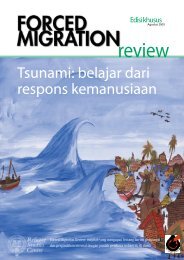FMR 42 full issue pdf - Forced Migration Review
FMR 42 full issue pdf - Forced Migration Review
FMR 42 full issue pdf - Forced Migration Review
Create successful ePaper yourself
Turn your PDF publications into a flip-book with our unique Google optimized e-Paper software.
<strong>FMR</strong> <strong>42</strong><br />
Sexual orientation and gender identity and the protection of forced migrants 43<br />
and migrants in North Africa and the Middle<br />
East, Latin America, Eurasia and South<br />
Asia throughout 2013. Training is provided<br />
for both IOM and partners in the field.<br />
The training provides a diverse toolkit<br />
for staff. Sensitivity training educates<br />
trainees about LGBTI persecution, myths<br />
and realities, and asks them to consider<br />
workplace inclusion. Skills training provides<br />
information about what questions to ask<br />
and which to avoid during counselling and<br />
interviews; correct LGBTI terminology;<br />
how to write successful LGBTI protection or<br />
persecution assessments; particular concerns<br />
for lesbians, bisexual women and transgender<br />
persons; challenges faced by refugees<br />
from particular geographical or cultural<br />
areas; LGBTI needs during interpretation,<br />
travel and transit; and assumptions that<br />
can create a barrier to assistance.<br />
We believe it is important that all staff are<br />
equipped to offer the highest quality of<br />
care to LGBTI refugees. Refugees come<br />
into contact with numerous staff during<br />
resettlement, including caseworkers,<br />
counsellors, interpreters, information<br />
centre staff, transit centre staff and medical<br />
health staff. They often spend significantly<br />
more time speaking with support staff<br />
than with caseworkers. For that reason,<br />
the training offers 14 modules that can be<br />
combined for a wide variety of personnel.<br />
For many staff, sexual orientation and gender<br />
identity are new or uncomfortable topics.<br />
Recognising this, the training promotes<br />
practical skills for refugee assistance<br />
professionals, rather than requiring staff<br />
to change their minds about LGBTI <strong>issue</strong>s<br />
within a one-to-three day training period.<br />
By approaching the topic in this manner,<br />
we found in the Middle East that trainees<br />
are then more receptive to broaching<br />
ideas about LGBTI equality, and less<br />
defensive of cultural or religious beliefs<br />
that may not align with those ideas.<br />
Training is the beginning of a process.<br />
While we move towards understanding<br />
and acceptance, the emphasis is first and<br />
foremost on our ability to serve LGBTI<br />
refugees with the same high level of<br />
professionalism we offer to others. Staff<br />
who complete successful LGBTI interviews<br />
or offer successful counselling and support<br />
services are acknowledged in front of their<br />
teams for their dedication and expertise.<br />
Beyond resettlement<br />
The <strong>full</strong> spectrum of LGBTI individuals<br />
exists in all of the communities we serve. In<br />
many cases, LGBTI refugees and migrants are<br />
marginalised or isolated in the humanitarian<br />
aid context due to a lack of understanding<br />
about LGBTI populations, their diversity<br />
and their particular vulnerabilities. Staff<br />
training, safe space initiatives and resourcesharing<br />
efforts are applicable not only to<br />
Resettlement Support Centers but also<br />
to organisations working in emergency<br />
environments, in refugee camps, with urban<br />
refugee and migrant communities, and in<br />
medical health services. Future projects<br />
should address these needs to ensure that<br />
LGBTI migrants and refugees are provided<br />
with a dignified experience at every stage –<br />
not just during resettlement. The experience<br />
gained and good practice developed<br />
within the resettlement context point to<br />
ways in which this this can be achieved.<br />
Jennifer Rumbach jrumbach@iom.int is the<br />
Resettlement Support Center Manager for<br />
South Asia in the International Organization<br />
for <strong>Migration</strong>. She was previously the Middle<br />
East North Africa Resettlement Support Center<br />
Deputy Manager for Iraq. www.iom.int<br />
1. The US Refugee Admissions Program Resettlement Support<br />
Centers are: Africa, Austria, Cuba, East Asia, Eurasia, Latin<br />
America, North Africa and Middle East, South Asia, and Turkey<br />
and Middle East.<br />
2. IOM currently administers Eurasia (based in Moscow, Russia),<br />
Latin America (based in Quito, Ecuador), North Africa and Middle<br />
East (based in Amman, Jordan), and South Asia (based in Damak,<br />
Nepal).<br />
3. Available on request from the author.<br />
4. Someone who “advocates for and supports members of a<br />
community other than their own”. UC Berkley Gender Equity<br />
Resource Center<br />
http://geneq.berkeley.edu/lgbt_resources_definiton_of_terms<br />
5. www.rainbowwelcome.org<br />
6. Advice and materials available from the author.




